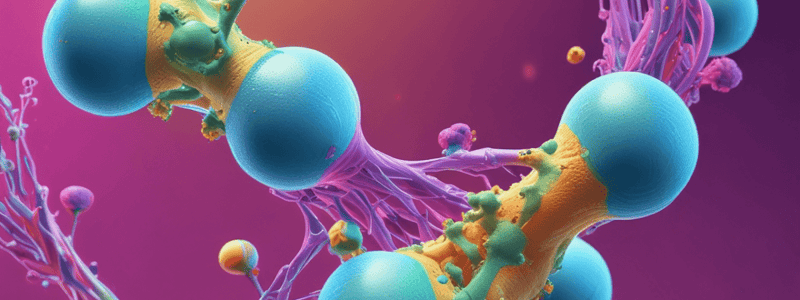Podcast
Questions and Answers
What is the primary mechanism by which water-soluble hormones exert their effects on target cells?
What is the primary mechanism by which water-soluble hormones exert their effects on target cells?
- They are internalized by receptor-mediated endocytosis and interact with nuclear receptors.
- They bind directly to intracellular receptors and regulate gene expression.
- They bind to cell membrane receptors, triggering a second messenger cascade. (correct)
- They diffuse across the cell membrane and interact with cytoplasmic proteins.
Which of the following statements accurately describes the amplification process in water-soluble hormone action?
Which of the following statements accurately describes the amplification process in water-soluble hormone action?
- The hormone induces the synthesis of additional receptor proteins, amplifying the cellular response.
- The hormone binds to multiple receptors, each initiating an independent signaling pathway.
- The hormone directly activates multiple protein kinases, resulting in a cascading effect on enzyme activity.
- A single hormone molecule activates multiple adenylate cyclase enzymes, leading to the production of numerous cAMP molecules. (correct)
What is the primary function of cyclic adenosine monophosphate (cAMP) in the water-soluble hormone signaling pathway?
What is the primary function of cyclic adenosine monophosphate (cAMP) in the water-soluble hormone signaling pathway?
- It serves as a second messenger, activating protein kinases that modify enzyme activity. (correct)
- It directly transports the hormone into the cell, allowing it to interact with intracellular targets.
- It binds to cell membrane receptors, initiating the signaling cascade.
- It acts as a transcription factor, directly regulating gene expression.
What is the significance of the amplification process in water-soluble hormone action?
What is the significance of the amplification process in water-soluble hormone action?
Which of the following best describes the interaction between insulin and glucagon?
Which of the following best describes the interaction between insulin and glucagon?
Which of the following statements accurately describes the synergistic effects of hormones?
Which of the following statements accurately describes the synergistic effects of hormones?
What is the role of G proteins in the action of water-soluble hormones?
What is the role of G proteins in the action of water-soluble hormones?
What is the primary function of protein kinases in the water-soluble hormone signaling pathway?
What is the primary function of protein kinases in the water-soluble hormone signaling pathway?
Which of the following statements accurately describes the amplification process in water-soluble hormone action?
Which of the following statements accurately describes the amplification process in water-soluble hormone action?
What is the purpose of the amplification process in water-soluble hormone action?
What is the purpose of the amplification process in water-soluble hormone action?
Which of the following statements accurately describes antagonistic hormonal interactions?
Which of the following statements accurately describes antagonistic hormonal interactions?
What is the significance of adenosine triphosphate (ATP) in the water-soluble hormone signaling pathway?
What is the significance of adenosine triphosphate (ATP) in the water-soluble hormone signaling pathway?
Which of the following statements accurately describes synergistic hormonal interactions?
Which of the following statements accurately describes synergistic hormonal interactions?
What is the role of cell membrane receptors in the action of water-soluble hormones?
What is the role of cell membrane receptors in the action of water-soluble hormones?
Which of the following statements accurately describes the function of cyclic adenosine monophosphate (cAMP) in the water-soluble hormone signaling pathway?
Which of the following statements accurately describes the function of cyclic adenosine monophosphate (cAMP) in the water-soluble hormone signaling pathway?



